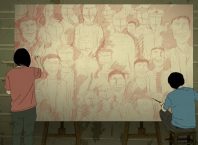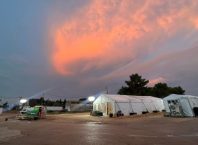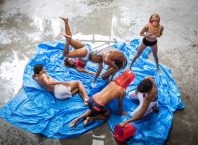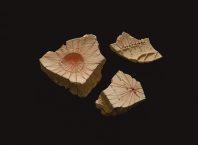The exhibition English Education, curated by Ravit Harari, will open at the Dan Gallery on Thursday, September 8, 2011, featuring four artists – Eyal Sasson, Guy Shoham, Peter Jacob Maltz and Suki Chan. Coming from different cultural backgrounds – three are Israeli, one English, two live and work in England, two live and work in Israel, and one born in Hong Kong – all four pursued their art studies in England: Sasson and Maltz at the Royal College of Art, Chan and Shoham at the Chelsea College of Art and Design.
Suki Chan, who will be exhibiting the video installation Tomorrow is Our Permanent Address in the gallery, and the video animation Breathing Silence will be screened on the outside wall of the gallery for one night only as part of the Gordon Show on September 8th, met with Midnight East at the Dan Gallery to talk about her work. Born in Hong Kong, Chan’s family moved to Oxford, England when she was six years old, giving her a dual relationship to her cultural environment which has perhaps contributed to her focus on issues of space and place in her work.
“I grew up in village in Hong Kong,” said Chan, “which is very different from what people think of as Hong Kong, the bright lights, tall buildings and skyscrapers. I have a more natural aspect of Hong Kong which people don’t really know about but it’s there… a place has so many different sides and we only know one aspect of it.”
![Suki Chan_Breathing Silence[1]small](http://www.midnighteast.com/mag/wp-content/uploads/2011/09/Suki-Chan_Breathing-Silence1small.jpg)
In terms of her connection to the two different cultures, Chan says, “I feel like I sit on the fence between them. I spent my formative years Hong Kong so a lot of my ideas were formed there, and also because within my family we’re fairly traditional, but obviously I was mixing with [English culture]. I think I grew up within that conflict. I was the only Chinese person in school. I wanted to be like other children, I even wanted to change my name at one point. As a child you don’t want to be different you want to be like everyone else. Later on when I went to art school I felt I could actually use that and explore it.”
These childhood experiences appear to be closely connected to the underlying themes in Chan’s work. “Broadly speaking,” she said, “my work is about space; how space becomes place. I’m interested in the tension between a place with a very strong identity and a non-place, a more generic place.”
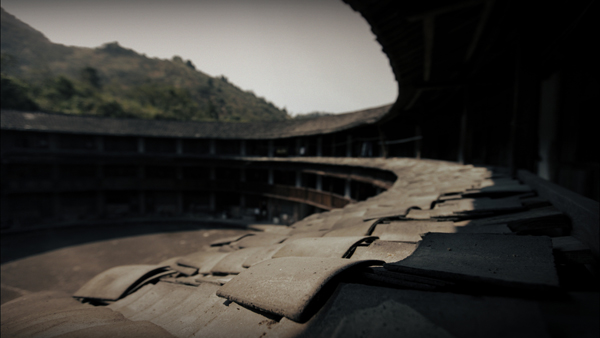
In Interval II (High Definition video 2008), Chan juxtaposes the two cultures, exploring the relationship between identity and architecture through roundhouses built for a migrant community in Southeast China, and a Victorian era cast iron pier in Northeast England. “I was very interested in the typology of the building [the roundhouses] and how it perhaps related to the identity of that particular group. They’re lived in by Hakka people. It means guest people. It sounds like a lovely poetic name for a group of people, well for me everyone is a guest in the world, but guest people is also a little bit like ‘go back to your own country’. Then I’m looking at a Victorian pier in the UK, and the identity that these sea side resorts have, people flocking there in the thousands. A lot of people have you know very strong memories of going to these places. There are certain films that are very strong in my mind like Love on the Dole [1941] where the couple for their first holiday away together get a train to Blackpool and have their first…couple holiday. It’s a little bit nostalgic and very much about people’s memory of a place and how their identity forms.”
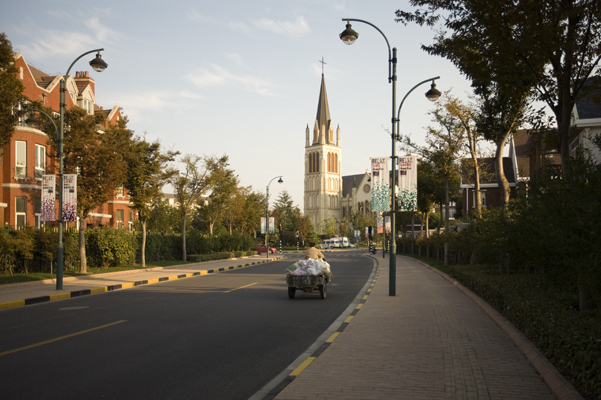
Chan’s interest in cities led her to work on a photographic project, A Place on Earth (2008), focused on Thames Town. “It’s a city built in a suburb of Shanghai but it’s built in the style of a village in England,” said Chan, “They grafting 500 years of English architecture into a site in Shanghai so it’s very interesting – where is this place? The reason why you build a building a certain way comes from the environment but obviously that’s been taken as a style and transposed to a new environment which is actually quite alien…the government was trying to encourage people to live in the suburbs of Shanghai so they were trying to build homes for people except these buildings cost a lot of money, so in the end, many people couldn’t afford them. Maybe my attraction to it was that it failed. I’m really interested in this idea of utopia/dystopia. You have high ideals and then something else happens.”
This direction of thought eventually led to the video installation that will be exhibited at the Dan Gallery: Tomorrow is Our Permanent Address. “At the same time,” Chan recalled, “I was very interested in the way that cities are becoming quite generic around the world. They’re looking very similar, you know, the local style, the local materials, methods of building are ignored by most architects and then they go for steel, concrete, and glass, materials that don’t necessarily come from the environment. I felt that a lot of them were competing almost to build this sort of building. You have these people saying ‘ours is the tallest.’ So after that feeling I wanted to create something that reflected that ideal trying to get higher and higher.”
“As a child I used to balance glasses, and I also used to do it with cards as well, you know, you put cards together and build a tower. So I started to balance these glasses just to kind of see how tall I could get and I started to think actually they looked like skyscrapers. Some of the towers I was building out of glasses reminded me of some of the buildings in Shanghai and then bit by bit I was collecting more glasses. I would go to charity shops to collect odd glasses and it was kind of important that I didn’t buy new glasses from the shop. I actually wanted something that was almost unwanted because it was an odd and I somehow wanted to gather all these bits of lone glasses together and form kind of a community, and it became bigger and it became a city…but I like the way that sometimes it looks like glasses too. It isn’t a perfect city you have to use your imagination too.”
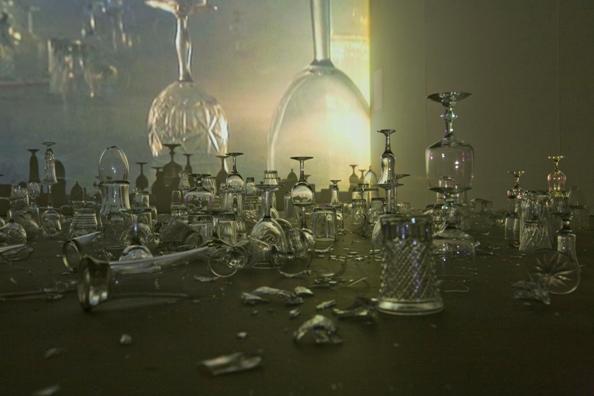
The finished work is an installation with video. Chan will be setting up her city of glasses in the gallery and the video will be screened through the glasses and projected on the wall. Given the nature of the installation, it is slightly different each time it is constructed. For Chan, there is a two-fold aspect to the piece, that of “creating something perfect, a shimmering city, and for me, the fragility, which is quite important because I think a lot of what we construct is quite precarious.” She developed the work over a period of six months, during her MA studies. “I’d build it in my studio then I would dismantle it then build it somewhere else, so it was growing piece.” At a certain point she felt that she “needed do something more with this work and that’s when the destruction idea came in. I needed to destroy it, the city and it was quite difficult. It took hours to build it and now I’ve got to somehow destroy it.”
It was at that point that Chan decided to create the video. I asked whether the decision to destroy the city might have inspired a desire to preserve it through video, and Chan responded, “Do you think so? I think it was more the performance – because I knew that now I’m going to break it – now I want to document it, but obviously the whole breaking became very important, because how am I going to break it?”
How does she destroy her glass city? Chan is not telling. When I asked her if one can figure it out when viewing the video, she laughed. “I don’t know. You’ll have to tell me,” she said, “Some people will think they know. It depends… it’s something that you would have an experience of as a child.”
The title for the work is a quote from Marshall McLuhan, who in turn was quoting poet e.e.cummings (the line is from the poem: all ignorance tobaggans into know). Reflecting on the title, Chan said, “What is tomorrow? Quite often I feel like we live like there’s no tomorrow… I think when you look at cities the layer of concrete is actually very thin so it doesn’t take long for foliage to come through, but obviously we’re here and we feel like its going to be forever…and the glasses it is about the end of the world, it’s apocalyptic. After the party, you know, like when you have a big party and then the glasses are broken – it also has that kind of playful aspect to it.”
The Gordon Show will take place on September 8, 2011
English Education will remain open through October 28, 2011.
Dan Gallery, 36 Gordon Street, Tel Aviv 03-5243968


